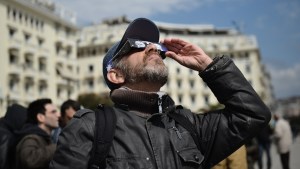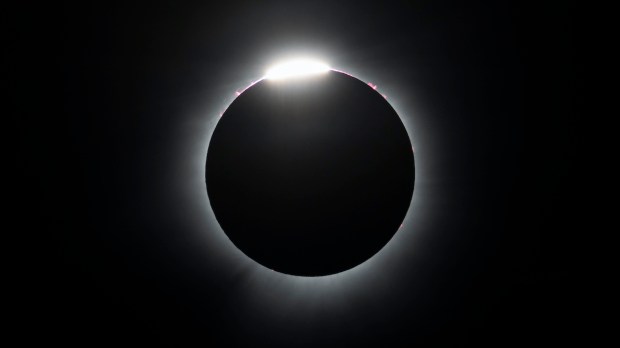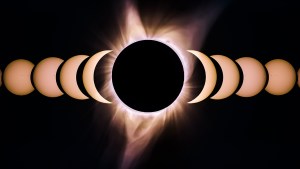Millions of people across the United States on Monday experienced a rare natural phenomenon that highlighted the grandeur of God’s creation. From the very young, who perhaps never before considered the order of nature, to the elderly, who might have appreciated something they might never again see, the 2024 total eclipse of the sun was a chance to come together and celebrate something truly out of the ordinary.
It’s been seven years since the last total solar eclipse moved across the continental United States, and it will be 20 years before another one occurs. Unlike the 2017 eclipse, which traveled from the Pacific Northwest to the Southeast, this eclipse started in Mexico and crossed the US from Texas to Maine, ending in Canada’s Maritime provinces.
Kristen and Darren Hillger of Garden City, Texas, who are catechists in their parish, took their three children out of school for the day and drove three and a half hours to a place where they could experience the totality of the eclipse — Kristen’s father’s home in Kerrville, Texas.
“We said this really feels like a once in a lifetime opportunity, so we’re gonna go ahead and pull them out for the day and travel down,” Kristen Hillger told Aleteia.
In spite of some cloudiness, it was worth the trip.
“It was beyond our imagination,” Hillger said. “We didn’t know exactly how dark it would get. We had about four and a half minutes of darkness. I think there was still a little bit of glow, but the street lights came on, there were a couple of cars that drove by that had their headlights on, and it was very just awe-inspiring to be in that moment of complete totality in the middle of the day, to have it get dark.”
It was about 2:30 in the afternoon, local time.
There were a couple of moments when the clouds would pass by “quickly enough for us to see the full eclipse and see the aura of the sun around the moon’s coverage,” she added.
“That was just so neat. It just felt like God gave us that little bit of a wink when he parted the clouds enough for us to be able to see the full eclipse, and the kids even said they were so glad that we were able to come and experience it,” she said.
Just about 10 days earlier, during the Easter Triduum, the family had been talking about the possibility that there had been an eclipse during the crucifixion.
“And so we talked about that, since we’re just a week out from Easter,” Hillger said, adding that her children – ages 13, 12 and 10 – “thought it was really cool to be able to experience maybe what it would have been like in Jerusalem during that time.”
Eclipse on campus
While the Hillger children were enjoying the eclipse with their grandfather and an uncle in a town somewhat off the beaten path, thousands of people were gathering on the Irving campus of the University of Dallas. Many of them were out-of-towners, perhaps out-of-staters, who were seeking a place along the path of totality.
In addition to music and food trucks, visitors were treated to a number of outdoors mini-academic lectures related to the eclipse, such as the way the ancients saw eclipses, psychological responses to eclipses, and the way plants behave during eclipses. Anthony Nussmeier, professor of Italian, gave a series of lectures on the role of the eclipse and the sun in Dante’s “Divine Comedy.”
There are five references to eclipses in the “Paradiso,” the third and last part of Dante’s epic poem, he said. “To have an eclipse you need to have a sun, and in the ‘Inferno,’ of course, there’s no light. So you can’t have an eclipse in a place where there is no light and no sun,” said Nussmeier, who in 2021 participated in a series of online lectures about Dante to mark the poet’s 700th death anniversary. For Dante, eclipses are not just a natural phenomenon, they are a supernatural phenomenon, one that requires a metaphysical and theological answer, not simply a physical, or astronomical answer.
As for Nussmeier, he had though that the coming eclipse, which was talked about in Texas for weeks, was overhyped.
But the actual experience disabused him of those sentiments. The peak was around 2:40 p.m.
“The moment it was happening, it was getting darker and darker from five seconds to the next five seconds,” he told Aleteia. “And it was really a disconcerting feeling at times, knowing that the sun is up there and it’s the middle of the day and yet it looks like dusk, and then dusk becomes night. I have to say that it was, in the end, not overhyped at all.”
In fact, the communal nature of the experience added another layer. “It was a unique experience to share with the community,” Nussmeier said. “It did bring a lot of people together. We had our families here, children were let out of school early, husbands and wives were able to experience it together. I did all that with my own family at the moment of totality, and so I would have to say, a unique and altogether surpassing experience that went beyond what I had expected.”
Short drive, big difference
Like many people, Amy and Scott Richert and family traveled to be in the path of totality. For them, it was only a 15- or 16-mile drive to Warren, Indiana. But to go from the 99.9% of coverage that was expected in their hometown of Huntington to what they ended up experiencing was worth even the rare, eclipse-induced heavy traffic they had to endure when they drove home.
Being stuck in traffic did give them a chance to discuss what they had witnessed, though.
“As it approached, you could notice as it’s starting to grow darker over the period of the eclipse up until totality, but it’s sort of subtle,” said Scott Richert, who is publisher of Our Sunday Visitor. “And then of course, as it reaches totality the sky goes dark, except down around the horizon, where you can see light all the way around. And you see the corona around the sun.”
Downtown Warren had a lot of people. But a hush came over the crowd as the eclipse approached totality around 3:08 p.m.
“You know, we live surrounded — even in the dark of night — by sources of light that are so essential to our experience of the world,” Richert told Aleteia. “And when we see a situation like this where you start thinking about the loss of light, and how it changes your experience, it’s very easy to start thinking about the spiritual parallels between that and the loss of grace.”
It was an experience that provoked further reflection.
“When John of the Cross and Mother Teresa spoke of the dark night of the soul, they did not mean a deprivation that convinced them that God does not exist,” Richert said later. “Quite the opposite: It is at those moments that we become most aware of our need for the light of Christ, just as it becomes obvious that the world around us at the height of an eclipse depends for its very life on the light of the sun.”



